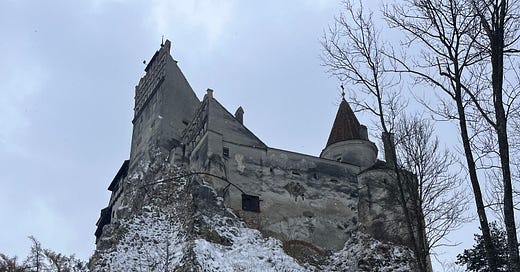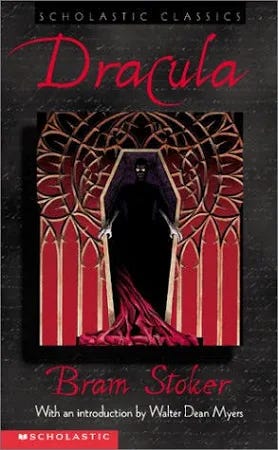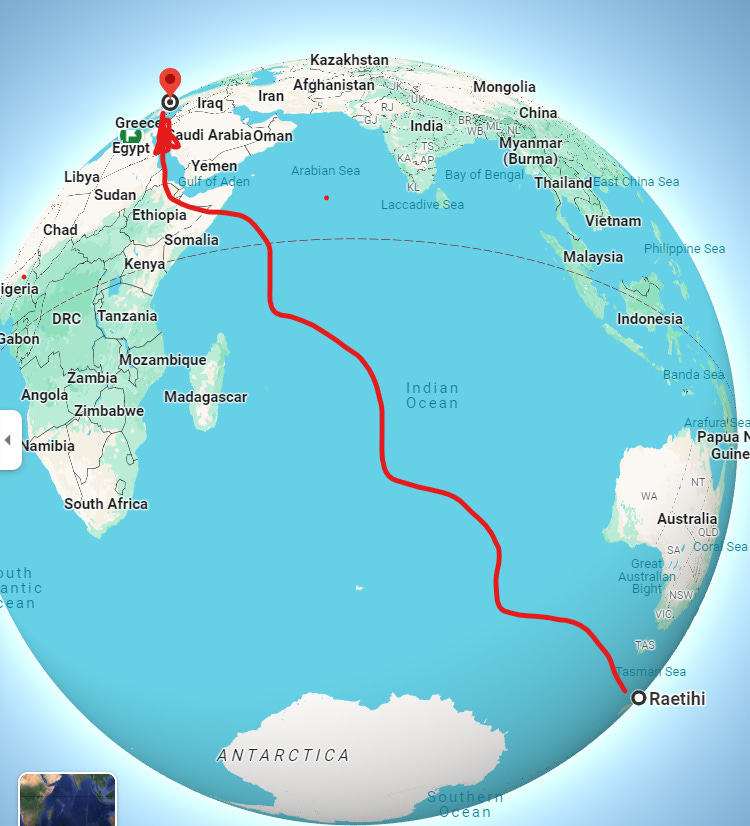I went to Transylvania the weekend before last. While I was there, it struck me how this was both an unlikely and an inevitable place for me to end up eventually.
Harking back to a newsletter I wrote midway through this year, Some books have a way of finding you, this thought ties into the reverberating, self-feeding effect that encounters with a book often trigger.
Though the catalyst for picking up that book can start all manner of ways— a flashy dust jacket, a recognizable author, a recommendation from a friend, a school assignment— once you’ve opened that front cover, you’ve started something that can’t be taken back. You’ve just handed your mind over to the manipulations of an author who may not even be alive anymore, and depending on how potent the writing is, you’re in for a ride that isn’t entirely within your control.
I’ll give you an example.
The Scholastic Gateway Drug
Back in primary school we used to get monthly book club leaflets, from a company called scholastic, sent to the classroom. Naturally, all the kids jumped right to the final page where the toy section lay. Who knows how those advertisers slithered their way in there? But that part was all fantasy. No one’s parents were dull enough to buy from that page. Or if they were, it only worked once. Seeing the novelty wear off in real time for their darling child who’d made torture sounds days before to express just how badly they needed said toy, only to discard that cheap plastic import five minutes after its arrival. I’m sure more than one vow of “never again,” was attached to the Scholastic toy page.
For the rest of us, after that swift bout of dreaming, we’d usually migrate back to the more realistic pages. Real books.
Of course like any kid, I got swept up in all the action/spy/fantasy young adult series that took over my generation, Alex Rider, Artemis Fowl, The Edge Chronicles, A Series of Unfortunate Events. I used to sit in the backseat of the family car, usually squished in between of two brothers (or three on some days) fighting through car sickness to read “just one more chapter.” But the one that really got it’s hooks in me was the Vampire Prince. I can still remember it’s cover.
Creepy. Not very primary school appropriate. Almost Blair Witch esque.
Immediately it appealed to me as something much darker than anything I’d read to that point. It was book three in a series I hadn’t read, but I begged for it anyway, and devoured it when it arrived.
This was pre-twilight, so the vampire genre hadn’t been overrun by pre-teen semi-erotic romance wave. (Of course, when that wave arrived, hollywood did their best to repackage this series and make it into ‘that,’ with their film adaptation of the books, but that’s another topic.)
In those days, Vampires were still an outsider topic. They weren’t trying to draw pop appeal, and unlike it’s mass promoted counterpart, the writing in the Darren Shan Saga was actually good1.
I distinctly remember a line where the main character was describing nervousness, and the author dug deep into the sensation of having too much saliva in his mouth. Not a huge thing, but I remember reading that and thinking, '“shit I thought I was the only one who that happened to.” I guess that’s the type of question you don’t ask people as a ten year old?
To me. A description that makes you consider reality in a way you haven’t before= good writing.
Strangely, for a vampire series, the appeal of these books lay in their realism. The series begins with a boy who encounters a vampire at a travelling circus.
Indulging both the fantasy to run away from home and join the circus, and the romantic idea of becoming a vampire, the boy asks the vampire to convert him.
There’s some hmmming and haaing from the vampire, but he eventually agrees. At which point the character must face the actual logistics of this.
Another revelatory moment for my naive farm kid mind:
He has to stage his own death. Watch his family grieve and attend his own funeral.
Dramatic stuff. But the hardest hitting scene, was a distinctly human moment where the main character stood outside his childhood home on the night before he’s about to leave it forever, watching his family go about their lives without him. He can’t join in. It’s emotional for him to watch them grieve, but there’s also a flicker of revelation there. He realizes that after he’s gone, his family’s lives, and the rest of the world for that matter, is going to keep moving ahead just fine without him.
Another big eye opener for a kid yet to see two digits.
And that was the tone of the whole series. It was all about heavy existential truths, making decisions that you can’t take back and accepting the consequences no matter how painful. It was about being on the border of a life, but never quite being able to participate.
I obviously wasn’t thinking in those terms at the time, but it’s interesting to consider how the broad aesthetic “VAMPIRES” can be the door opener for something a little bit deeper. That’s why, when they repackage genres like this and make it into something shallow, it seems like such a waste to me. What’s the point in captivating the attention of teen culture if your entire message is…sparkling Robert Pattinson.
(In fairness, Robert Pattinson has been in some good movies since then so I’ll pull my foot off that throttle here.)
The impact of Dracula
So, after I caught the vampire bug, guess what I went to every Halloween party as? Dracula, Van Helsing, anything and everything vampire or vampire adjacent became intoxicating to me.
Touching back on to the scholastic leaflets, I saw the original Bram Stoker, Dracula novel, advertised in there—God knows why that title was included in a leaflet designed for a sub thirteen year old age group, but I’m thankful for it—and begged my parents to buy it for me.
Naturally that novel is (was?) written in the language of its time and was far too advanced for me. But I swallowed it down like broccoli and convinced myself that I was enjoying every minute. Until, I did start enjoying it.
That was the first genuine adult book I ever read and as I touched on above, it carried me on a wave I would never have got on by following the trajectory of my immediate peer group, the culture etc.
Perhaps I’m over playing this, but can anyone deny that while you are consuming them, books get inside your head? How much of a leap is it to propose that they’re rewiring a few neurons while they’re in there and rearranging the direction of your natural thought processes.
In simpler terms, this is how it played out for me.
Up to that point, dry, “boring” adult books intimidated me. All I was interested in was action, mystery etc.
Post Dracula, this changed.
I’d tasted something in that novel—I was “bitten” by it, if you will—and now looked at the world of literature as a way to learn things about life that isn’t quite accessible in more consumable media.
There’s something about the hours you spend with a novel that lets ideas turn over themselves. In between the intervals that you read one chapter to the next, your mind has the opportunity to parse out meaning in ways that a more immediate medium such as a movie doesn’t let you do.
There’s also less of a censored element. Books contain thoughts and insights that people simply don’t share in ordinary conversation. And the medium is bound only by the texture of your own imagination, therefore, all an author needs to do is carry you to the edge of an idea and let your mind do the rest.
Through Dracula, I learned that a little bit of pain in the beginning can reap outsized rewards, so long as you are willing to put in a little bit extra effort than most people are willing to.
I’ve carried this lesson through my whole life. It’s led me onto other books, each of which have contained their own lessons (which I wouldn’t have had access to without Dracula) and the chain continues.
So Romania
Getting to Romania, the feature that jumped out at me was the contrast in architecture. Different eras, juxtaposed in building form, from one block to the next.
The Roman era (did you ever draw that connection with the name of the country?), the nation’s period as a monarchy, communism and now modern day.
Before making the trip I had a long discussion to a native Romanian who went into elaborate detail about the corruption in her country’s contemporary “democracy” and the inequality that presides.
She waxed poetic on the “glory” days of communism. How things were better for the people, more equal, less corrupt. Bear in mind, she was describing the Ceaușescu era, the only communist government that ended in a violent overthrow of it’s leader (by its own people.) Somehow, It’s hard for me to match the romantic image she was painting, with the knowledge that this leader and his wife were murdered in the street by his own people. But, I’ll leave it at that.
In any case, visiting Romania, merged two slight obsessions of mine—the vampires from my childhood and my more recent fascination with totalitarian regimes—in ways that I hadn’t thought they would fit.
In the same vein as I did with Dracula, over the years I’ve force-read my way through hours of history textbooks depicting the cold war. Some good, some as dry as weet-bix without milk.
For no good reason, I’ve got an outsized outline of Stalin’s reign over eastern Europe and the still prevailing reverberations of the iron curtain swirling around my head.
So when I visited Bran Castle (what is thought to be the inspiration for Bram Stoker’s Dracula) and learned that it was confiscated from it’s royal owners during communism and only began being consciously promoted for it’s Dracula link at that point, these pieces fell into place in a revelatory manner.
These “useless” facts harmonized inside my head as I stood there in a thirteenth century castle, and I realised that everything I understood about this place was equally as informed by Darren Shan’s “Vampire Prince,” as it was by anything I’d read as an “adult.”
No history book I ever picked up can detach itself from that original chain of command. Darren Shan comes first, then Dracula, then the rest.
Thanks to hat shiny papered leaflet that delivered me “The Vampire Prince,” despite almost two decades since I’d first given this drafty castle any thought, despite more kilometers than google earth can be bothered sharing with me, I had personal context in this entirely foreign place.
And yes, this personal connection can largely be written off as “useless” knowledge.
It doesn’t make me any money, invent any new technology. The only purpose it serves is in rendering my immediate environment slightly richer. Allowing me to see more in a given object than might otherwise be apparent.
But to me, that’s what life is. Mapping your knowledge onto the world. Acquiring knowledge that adds meaning in places where it was previously absent.
That’s the gift of Dracula.
Although I haven’t actually gone back to check whether this is just a rose-tinted memory, so I could be very wrong on this.










